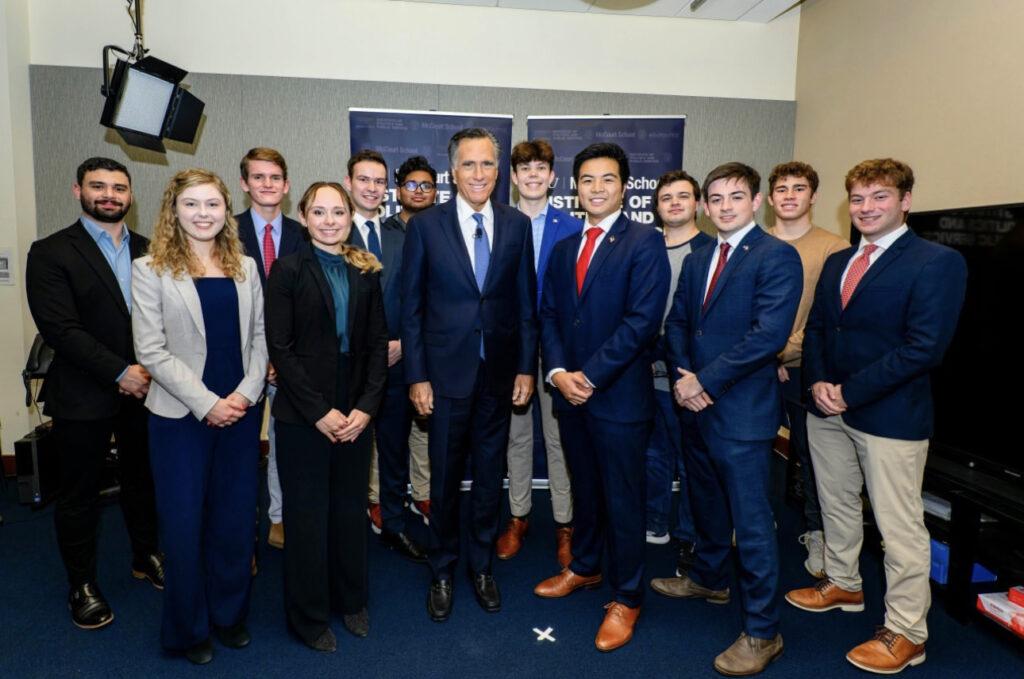Senator Mitt Romney (R-Utah) said the rise of misinformation and performative politics is hurting American democracy in a moderated discussion at Georgetown University.
“Politics itself has become more of a performance art,” Romney said at the Oct. 17 event. “How does a democracy work, one, when the population is getting information that may or may not be accurate, and two, when the people that are most well known are those that aren’t accomplishing anything, but instead are performing?”
The Georgetown Institute of Politics and Public Service (GU Politics) hosted Romney to speak to 600 students and faculty about his career and the state of politics in the United States. Mo Elleithee (SFS ’94), the executive director of GU Politics and a former Democratic operative moderated the event.
In the first half of the discussion, Romney discussed bipartisanship, the 2024 presidential election and political polarization. He then participated in a question-and-answer session with students.
Romney has gained national attention ahead of the 2024 elections after announcing he will not run for reelection to the Senate to make room for younger candidates.

Romney criticized the proliferation of misinformation and extreme opinions on social media, and said politicians who spread such misinformation do not actually want to legislate for their constituents. He called out Rep. Jim Jordan (R-Ohio) and Sen. Bernie Sanders’ (D-Vt.) lackluster record on successfully passed bills, saying that despite Sanders only passing three during his tenure in Congress, and Jordan passing none, they still attract large followings due to their extreme ideas and rhetoric.
“You have people increasingly coming to Washington whose objective in staying in office is to make noise, not to make law, not to change things in a way that might be better for the country,” Romney said.
Romney said the rise of social media-focused politicians creates an unwillingness to compromise on major issues, such as the refusal of House Democrats to back a Republican Speaker candidate as they pass the second week of voting.
He pointed to stats from the GU Politics Battleground Civility Poll, which shows that 83% of respondents believe compromise and common ground should be the goal for political leaders. However, 82% said they are tired of leaders compromising their values and ideas and want politicians in power who will stand up on their side.
Romney urged compromise, rather than digging into entrenched political positions.
Romney, a relatively moderate Republican, previously served as the governor of Massachusetts and as the GOP’s 2012 presidential nominee. He was a prominent critic of former president Donald Trump’s administration upon taking office in the Senate in 2019, voting twice for Trump’s impeachment.
Romney emphasized the importance of politicians putting national interests over personal ones in making decisions, such as his choice to vote for Trump’s impeachment.
“Maybe the greatest conflict that I’ve experienced as a senator has been reckoning with a belief that voting to convict Donald Trump was very bad for my personal self, that it would create a risk for me personally for my family, that it would be a disaster politically,” Romney said. “At the same time, I felt ultimately at the end of the trial, it was the right thing to do.”
Romney said the Republican Party’s culture has completely changed since Trump’s election, even though many of the policy priorities have stayed the same — which the disproven claims of fraud in the 2020 election exemplify.
“Approximately 70% of Republicans still say that Donald Trump won the election. Are we going to abandon truth to that degree? It’s absolutely absurd,” Romney said.
Romney said the 2024 election and the identity of the Republican nominee would be crucial in determining the future of the party and the country, with a non-Trump candidate setting a new tone for the RNC and reorienting the party, while a Trump win would legitimize the place of the MAGA right.
“If we nominate Donald Trump, which I expect, that’s what our party’s going to be for these four years,” Romney said. “If he loses, there may well be a search for something new or a different kind of leader.”
Romney said his party’s shift towards Trumpism and so-called culture war issues like COVID-19 and critical race theory has alienated younger, more diverse voters.
“Young people are not signing up as MAGA,” Romney said. “Ultimately, my party has no electoral prospects if all we can give is old white guys.”
Romney encouraged the audience to remain hopeful for the future of America, despite daunting challenges like immigration, climate change and AI security threats, because of its promise of freedom.
“Freedom allows people independent thought to achieve extraordinary things never imagined would occur and that’s what allowed us to lead the world for such a long period of time,” Romney said. “I’m still betting on the United States of America, and that’s because of freedom.”




















